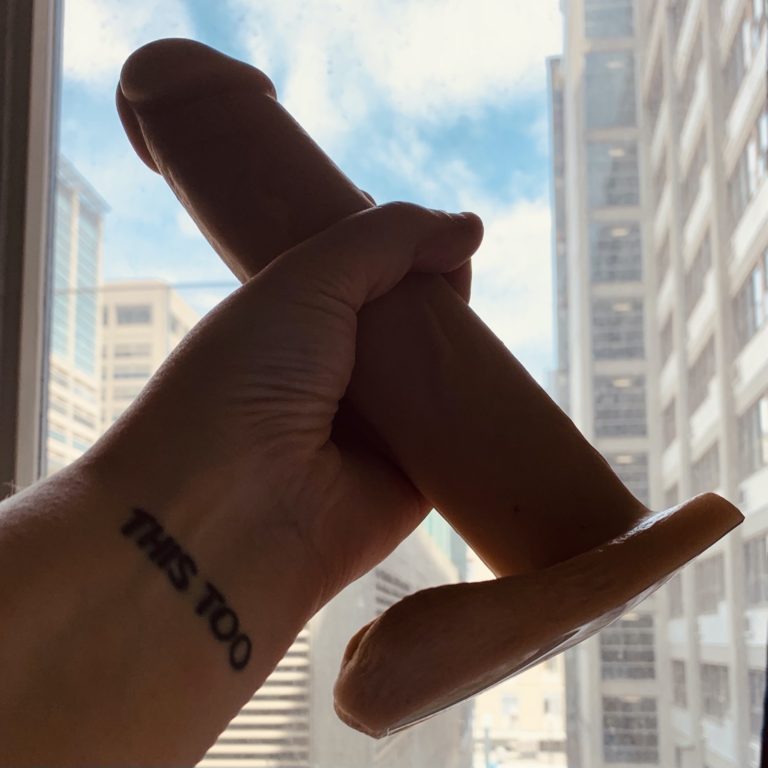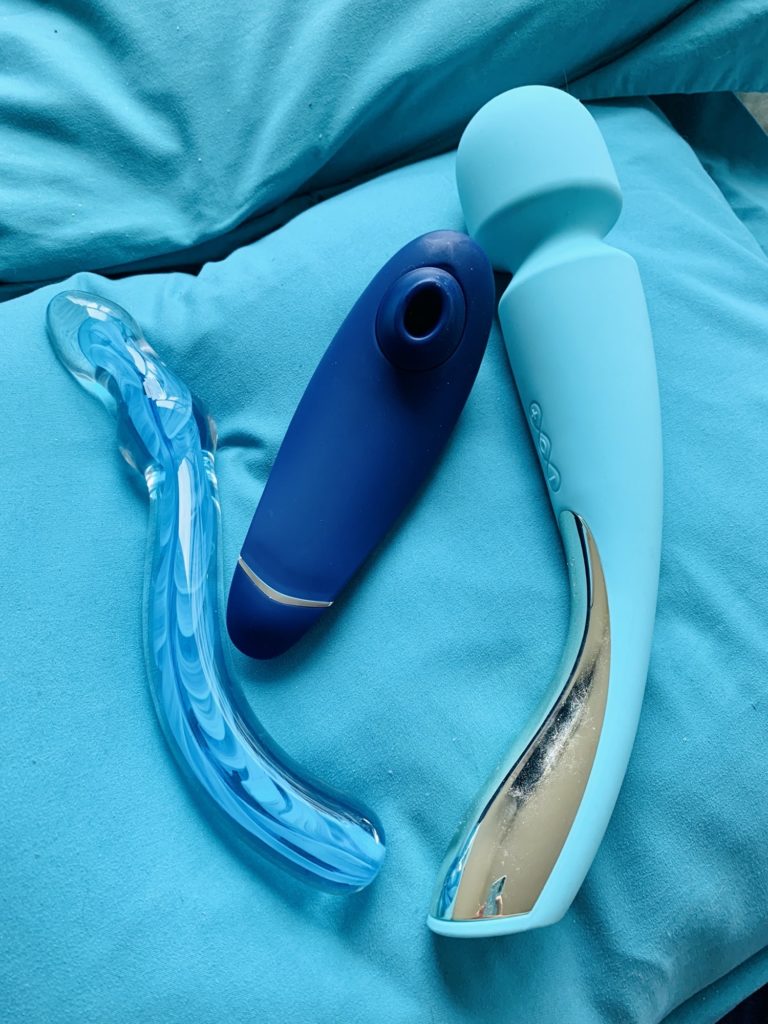
Does penis size matter?
The short answer: It matters to some people, and less so (or not at all) to others. Whatever your size, the important thing is to find a partner (or partners) who enjoy it. Those people exist, regardless of what size you are, I promise.
Longer answer: Anyone who tells you penis size universally doesn’t matter is lying to you, but anyone who tells you penis size always matters, or that bigger is always better, is lying to you too. The truth is that different people have different preferences. I know you want a simple answer, but there isn’t one, because human sexuality is infinitely vast and variable, and so are human bodies.
There are “size queens” out there, yes. There are people who are shitty and judgmental about penis size out there, yes. However, there are also people who prefer smaller dicks because they find them more comfortable, less painful, easier to accommodate orally or anally, more aesthetically pleasing, or any number of other things. As with literally everything sexuality-related, we’re all different and it’s just a matter of finding the person/people you’re compatible with.
Keep in mind, too, that the vast majority of people with vaginas don’t orgasm from vaginal penetration alone. The clitoris, not the vagina, is the pleasure equivalent of the penis – meaning that pleasure and orgasm without clitoral stimulation are about as rare and as difficult as pleasure and orgasm without any penile stimulation (i.e. certainly not unheard of, but not the default for most people). Penises aren’t generally magic orgasm-producing machines for the people you fuck them with, and that’s true regardless of their size.
Does penis size matter to you, personally?
Sure, in that I have a different experience with different penis sizes, in much the same way that a huge dildo feels different from a smaller one. Neither is inherently better than the other. It depends entirely on my mood, where I am in my cycle, any health issues I’m going through at the moment, which erogenous zone(s) I’m hoping to target, what fantasies I’m enjoying recently, and other such variables.
What does “average-sized” mean in the context of penis size? / What “counts” as big or small?
Studies generally find that the average penis size is in the neighborhood of 5 to 5.5 inches long. I would personally define a big dick as being 7” long or more, and a small dick as being 3.5” or less, but keep in mind that a) there’s nothing inherently wrong with having a small or large dick, as discussed, b) that doesn’t take girth into account and it can be a pretty huge factor (so to speak), and c) different people will define these terms differently depending on their preferences and amount of experience.
If you’re wondering if your penis is “normal,” 1) it probably is, and 2) a doctor can answer that question for you better than I can if you’re really worried.
Can I change my dick size?
There are surgeries for this, but I wouldn’t recommend them. They seem risky and not all that necessary. There are also pills/supplements whose makers claim they can alter your dick size, but I’ve seen zero evidence that this is at all accurate.
In my experience, usually body-related insecurities are more about your preconceptions and perceptions than your actual body (barring certain potential exceptions like gender dysphoria), so if you’re worried your dick isn’t pleasurable enough, you’d be better off upping your oral sex game and getting really good at wielding dildos than getting a dangerous procedure to alter your most sensitive organ based on your limited notion of what partners might find pleasurable.
Penis pumps enlarge the penis temporarily, and are sometimes used regularly over time to encourage penile growth, especially for transmasculine folks’ dicks after going on testosterone. I also know that there are stretching devices that can lengthen your dick when used in the long-term, sort of like braces for your penis. But again, personally, I don’t consider these measures worthwhile when there are so many other ways you can work on your sexual skill and sexual confidence.
Aside from surgery, I don’t know of any way to make your penis smaller.
What if my partner doesn’t find my dick size satisfying?
Well, first off, if they’re expressing that to you in a way that feels hurtful and mean, that’s a red flag. Body-shaming of any kind in a relationship is almost always a bad sign about your partner’s attitudes on bodies and their ability to be tactful and polite.
Beyond that, if you want to give your partner the sensation of getting fucked with a larger cock, you can use silicone penis extenders, fuck your partner with a dildo (possibly one that is strapped onto your body with a harness), use your fingers/hand, or use a penis pump immediately prior to sex. Check out the /r/SmallDickProblems subreddit for more advice.
If your dick is too big for your partner, you can try using an Ohnut to limit the amount of length you can fuck them with, use smaller dildos/strap-ons on them, use your fingers, use a hell of a lot more lube, do more “foreplay,” or just do non-penetrative sexual activities. (As noted above, most people with vulvas get off most readily from clitoral stimulation anyway.) The /r/BigDickProblems subreddit also contains lots of advice on this.
Presumably, your partner is attracted to you because of who you are, not just what your dick can do. If that’s not the case, you may not be in a healthy and emotionally safe relationship.
What’s more important: length or girth?
Again, depends entirely on the person, and may change from day to day or from moment to moment. There isn’t just one “right answer” to this question, and anyone who tells you otherwise is lying to you, probably to make you feel insecure and/or sell you something.
Length may be important if your partner likes A-spot stimulation or cervix stimulation, for example, while girth may be important if they like intense G-spot or prostate contact. Some people may want a shorter or skinnier dick for comfort reasons, or because those can hit their spots more easily.
Hell, I’m a sex toy reviewer and thus intimately familiar with my own preferences, and even I can’t say definitively whether I care more about length or girth, because it depends on the day, the sensations I’m seeking, any health issues I’m going through, etc. Luckily, sex toys exist, so I don’t have to rely on a partner’s penis to provide any and all penetrative sensations I might be craving at any given time. (Sensing a theme here?)
How big does a penis have to be to hit the G-spot or prostate?
Usually about 2-3″ long, ideally with a curve (either upward or downward will work, depending on the position). However, again, sex toys are great for this. In many cases they’re better than dicks at hitting these spots. (I recommend the Pure Wand and Seduction.)
How big does a penis have to be to hit the A-spot?
I think a lot of people assume I am a hardcore size queen because I like A-spot stimulation, but… nah. Many partners of mine have been able to reach my A-spot easily with their fingers, including those with shorter/smaller fingers. It’s all about angling and positioning. Have the receptive partner pull their knees closer to their chest to shorten the vagina’s length, and you’ll have an easier time reaching the A-spot with your dick, your fingers, or a toy. Anything upwards of about 5″ can hit my spot just fine, and sex toys exist anyway so it’s not like a penis is the only option here.
Will using a dildo that’s larger than my penis make my partner leave me/like my dick less?
Unless your partner is literally only dating you for the usage of your penis, no, it’s unlikely that anything like this will happen. I know that it’s easy in a phallocentric culture to feel like your penis is the only thing tethering you to social and sexual success (whatever the hell that means), but there is more to a relationship – and more to sex – than the size of your cock, I promise.
A dildo cannot pay attention to your partner’s signs and speed up or slow down or fuck harder or softer as needed, the way you can. A dildo cannot whisper filthy shit in your partner’s ear or roleplay their favorite fantasy with them like you can. A dildo cannot hold them close after they come and make them feel safe and loved the way you can. You are so much more than a dildo, and you can do so much more than a dildo can. If you don’t know/believe that, consider working through your self-esteem issues with a therapist – you deserve to recognize your own value as a human being beyond your genitals!
What condom is best for my penis size?
Many people don’t know that condom fit can have an enormous impact on how pleasurable and comfortable sex is for you. I would suggest checking out the Find Your Size page on LuckyBloke for an introduction to this.
Keep in mind, when shopping for condoms, that many are labeled in misleading ways (e.g. Trojan Magnum condoms are the same size as some other brands’ standard/medium size), so looking at the measurements will give you a better idea of potential fit than the product’s branding will.
If you want a super custom fit, One makes a condom line called MyONE that seems to be the best option for people who chronically struggle with condom sizing. My partner got to try some in their size recently and really liked them; they said it felt like wearing a perfectly tailored suit.
If you’re accustomed to a particular penis size, is it normal to have trouble adjusting to/enjoying a different-sized one?
Sure, especially if you have very particular preferences (which isn’t morally wrong or anything, and is nothing to be ashamed of, as long as you’re not shitty about it).
Sex toys are your friends. They can help you access sensations you’re not otherwise able to access, including the sensations of being penetrated by something smaller or larger than your current partner’s penis. Don’t frame this as a shaming thing if/when you bring it up; you don’t want to give your partner a traumatic complex about their dick. Size is just one variable of sexual sensation, and there doesn’t have to be a value judgment attached to the idea of wanting to be fucked by something smaller or larger.
As mentioned above, silicone dick extenders and strap-ons can help if you really want to feel like your partner is fucking you with a dick that’s a different size from their own.
Does ball size matter?
To some people, yeah. Everything you can think of matters to someone. I have never really cared about this or even noticed variances in ball size all that much, personally, though.
Will dick size affect my experience with a stroker?
Potentially, yes. While many of these toys are at least partially flexible/squishy, some have less give than others. If you’re on the larger side, I’d suggest searching the names of any potential purchases in the /r/BigDickProblems subreddit to see if anyone there has reviewed that toy for their particular dimensions. If you’re on the smaller side, I’d recommend toys by Tenga, which tend to be snugger-fitting than, say, Fleshlights. It’s always a good idea to read sex toy review blogs, too; some reviewers mention their dick size, so you can more easily compare their anatomy to your own and find out whether the toy they liked would work for you too.
Do big dicks stretch out vaginas/anuses?
Temporarily? Yes. Permanently? No. These orifices are made of tissue that can expand as needed to accommodate various sizes of penetrating objects, but reverts to its original position/size in due time afterward. Anything you’ve ever heard about loose, stretched-out pussies or butts is a medically misinformed myth, usually propagated with the intention of discrediting and dehumanizing anyone perceived as being a “slut.” I know you don’t want to participate in a practice as vile and demeaning as systemic slut-shaming, so I know you’re not going to perpetuate this myth anymore. Right?
How does transitioning affect penis size for trans and non-binary people?
I’m cis and don’t have firsthand experience with this, but would recommend anything written by Ana Valens on the subject (for transfeminine people). As for transmasculine folks, here’s an episode of the Dildorks where I talked with Bex about his T-dick growth (among other things), and this article by Oak is also great.
Is there any equivalent insecurity to penis size that people with vaginas have?
You know, every time I’ve been asked this, I’ve immediately thought that for cis women (the only gender group I’ve been a part of, and thus the only gendered experience I can directly speak to), our entire bodies are scrutinized and criticized in similar ways to how penis size is discussed for cis men. Our overall body size, boob size, vaginal tightness, vaginal scent and taste, and capacity for vaginal lubrication are some more specific areas where we’re encouraged to be desperately insecure and self-hating. I don’t think these things are directly comparable because they manifest somewhat differently, but, short answer: yes. People with penises don’t have a monopoly on feeling shockingly profound shame and self-doubt about the sexual attractiveness and viability of their bodies. That widespread shame sucks, and it needs to change – for everyone, of every gender and body type.
What questions do you hear a lot about penis size?

 Sex toys are often an impulsive purchase. You’re horny and you order the dildo you wish you could use right now, or you fantasize about flogging your partner and have to immediately purchase the equipment needed to follow through on this fantasy, or you read a saucy sex toy review online that riles you up and you order the product on the spot. Promotional slogans like “FREE shipping on orders over $35” and “
Sex toys are often an impulsive purchase. You’re horny and you order the dildo you wish you could use right now, or you fantasize about flogging your partner and have to immediately purchase the equipment needed to follow through on this fantasy, or you read a saucy sex toy review online that riles you up and you order the product on the spot. Promotional slogans like “FREE shipping on orders over $35” and “



